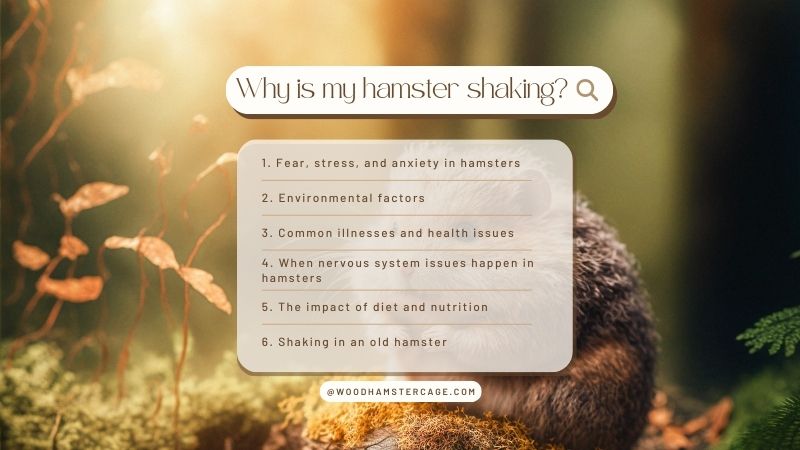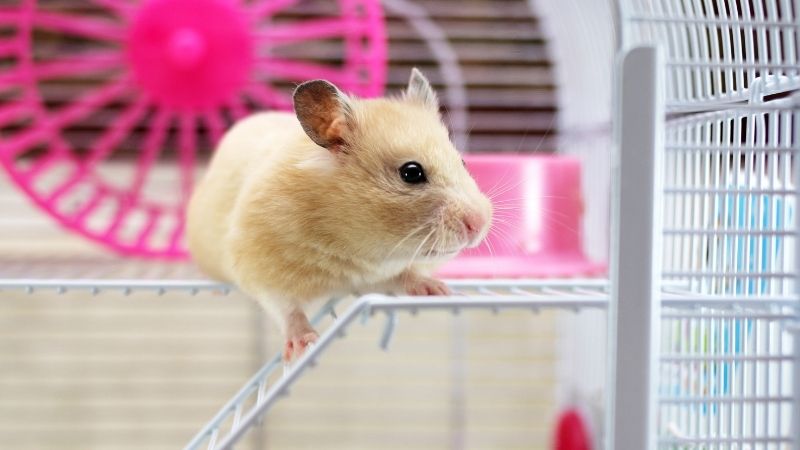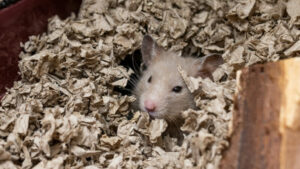
Can You Travel with a Hamster? A Comprehensive Guide
Traveling with a pet hamster isn’t as straightforward as it might seem. It requires careful consideration of your pet’s safety, comfort, and the logistics involved.

Why your cute little hamster is shaking? Don’t worry, it’s pretty normal for these tiny friends to shake or tremble now and then.
Most of the time, it’s nothing serious. But sometimes, if your hamster shakes a lot, it might mean they’re not feeling great or something’s bothering them.
In this easy-to-follow guide, I’ll walk you through why your hamster might be shaking, and how to stop the hamster from shaking. Some handy tips on what to do about it.
Hamsters are really interesting little guys. They do a bunch of things that might seem strange but are totally normal for them.
It’s super important for us hamster owners to get what these actions mean to make sure our furry friends are happy and healthy.
In this part, I’ll chat about the regular stuff you’ll see hamsters do, like running around at night, keeping themselves clean, and just being their playful selves.
One big reason hamsters shake is because they’re scared, stressed, or anxious. These little ones are naturally prey animals, so they get frightened pretty easily.
Loud sounds, quick movements, or new places can freak them out, making them shake or tremble.
If you’ve just brought home a new hamster, it’s normal for them to be a bit nervous and shaky as they get used to their new home.
Solution: Making their space chill and comfy
To make your hamster feel safe, try to keep their space calm and quiet. Stay away from loud noises and put their cage in a part of your house that’s not too busy.
Hang out near their cage, talk to them gently, and give them treats to build trust. Slowly bring in new toys or tunnels to keep their minds busy and help them get braver.

Related reading >> Why Do Hamsters Run On Wheels?
Hamsters are really sensitive to temperature changes, and getting too cold or being in a draft can make them shake.
Make sure their cage isn’t in a drafty spot or too close to where the sun shines in or near heaters. Keep their home at a comfy temperature, around 65-75 degrees Fahrenheit (18-24 degrees Celsius).
Remember, not all hamsters hibernate. But some dwarf hamster types might go into a kind of hibernation called torpor. If they’re in torpor, they might shake or tremble as their body temperature goes down.
Solution: Making their space chill and comfy
Setting up the perfect cage: Make sure their cage is always clean and safe. Don’t put it where it’s too hot or too sunny, as hamsters can get stressed by extreme temperatures.
Check that their room stays between 65-75 degrees Fahrenheit (18-24 degrees Celsius) to keep them comfy.

Shaking can also mean your hamster isn’t feeling well. A common sickness is a wet tail, a bacterial infection in the tummy. Other signs of a wet tail include diarrhea, a dirty tail, not eating much, and being really tired. Wet tail is serious and needs quick vet care.
Other health problems that might make your hamster shake are things like colds, bugs, or tooth trouble.
Solution: If you see other symptoms like sneezing, scratching, or trouble eating, you should talk to a vet to find out what’s wrong and how to help your hamster.
Sometimes hamsters have problems with their nerves or brain that cause shaking. These could be something they’re born with or develop over time. Seizures, balance issues, or tremors can make them shake or tremble without control.
Solution: Spotting and handling sickness
Keep an eye on your hamster for any signs they’re not feeling well, like shaking, not eating much, acting differently, or having breathing troubles.
Learn about common hamster health problems so you can catch anything early. Regular vet visits are important, too, to keep your hamster healthy and catch any issues quickly.
What your hamster eats is really important for their health. Not eating the right foods can cause health issues, including shaking.
Solution: Feed them right
Make sure they’re getting a good mix of fresh fruits and veggies, quality hamster food, and some treats now and then.
Stay away from too much sugar or fatty foods. Always have fresh water available, and keep their water bottle clean.
Not drinking enough water can cause shaking and other problems. Also, keep an eye on their weight to make sure they’re staying healthy.
Related reading >> Can A Hamster Eat Apples? The short answer is yes, you can know more about the benefits and precautions from that blog.
Related reading >> Can Hamsters Safely Eat Blueberries? Surely yes, learn more from the blog.
Related reading >> Can Hamsters Eat Celery: Including Stalks And Leaves Yes, but, you need to be careful when preparing it.
Related reading >> Can Hamsters Eat Bread? Yes, they can. but in limited amounts.
As hamsters age, the old hamster may experience natural changes that can result in shaking or trembling. Just like humans, hamsters can develop age-related conditions such as arthritis, which can cause discomfort and shaking.
Solution: Changes as hamsters get older
It’s essential to provide a comfortable and supportive environment for older hamsters.
Offer soft bedding, and low-entry access to their cage, and consider providing additional hiding spots and ramps to accommodate their changing needs.

Being gentle with your hamster is really important. Approach them calmly and let them come to you. Don’t force them to hang out if they’re not in the mood.
When you pick them up, use both hands to support them safely but softly.
Remember, hamsters are super delicate, and too much handling or rough play can scare them, making them shake.
Catching problems early and getting the right diagnosis is key to taking care of any health issues your hamster might have.
This part talks about the main things to watch for and how to get ready for a vet visit.
It’s pretty normal for hamsters to shake once in a while, but some things are a heads-up that you should take them to the vet.
If your hamster is shaking and also not eating, acting differently, or having trouble breathing.
Or if your hamster’s shaking is accompanied by other symptoms such as loss of appetite, weight loss, lethargy, or changes in their fur or skin,
These additional symptoms may indicate an underlying medical condition that requires treatment.
Also, if the shaking keeps going or gets worse, you should see a vet for a full check-up and to find out what’s going on.
Before you go to the vet, it’s a good idea to write down what’s been going on with your hamster.
Keep track of any changes in how much they eat or drink or in their bathroom habits.
If you can, take a video of your hamster shaking to show the vet. Be ready to talk about what your hamster eats, where they live, and anything new that might be causing the shaking.
Giving your vet all this info will help them figure out what’s wrong and make sure your hamster gets the right treatment.

Hamster owners often have questions about their pet’s shaking or twitching behaviors, these FAQs cover a range of topics related to hamster shaking.
Yes, twitching can be normal for hamsters, especially during sleep or when they are experiencing a dream.
If the twitching is constant or accompanied by other concerning symptoms, it’s best to consult a veterinarian for further evaluation.
No, shaking is not always a sign of distress in hamsters. It can be a natural behavior or a response to environmental factors such as temperature changes.
However, if the shaking is persistent, accompanied by other symptoms, or your hamster appears visibly distressed, it’s important to investigate further and seek veterinary advice if needed.
To calm a shaking hamster, create a calm and quiet environment for them. Avoid sudden loud noises and make sure their cage is located in a draft-free area.
Spend time near their cage, talking softly and offering treats to build trust. Gradually introduce new stimuli, such as toys or tunnels, to keep them mentally stimulated and help them overcome their fears.
Hamsters might shake with their eyes closed during sleep or when experiencing a dream. This is generally considered normal behavior and nothing to be concerned about.
However, if the shaking persists or is accompanied by other symptoms, it’s best to consult a veterinarian for further evaluation.
Hamster shaking and a stroke can appear similar, but there are distinct differences. Hamster shaking is often accompanied by other symptoms such as fear, stress, or environmental factors.
On the other hand, a stroke in hamsters can cause severe disorientation, loss of balance, and paralysis. If you suspect your hamster may have had a stroke, it’s crucial to seek immediate veterinary care.

So, shaking can be just a normal thing hamsters do, but it can also be a sign that something’s not right.
Getting why your hamster might be shaking – whether it’s because they’re scared, uncomfortable, not feeling well, having diet issues, or just getting older – is really important.
This helps you figure out how to help them. Making their home a calm place, keeping their cage comfy, and taking care of any health worries are all ways to look after your furry friend.
Don’t forget to see the vet when you need to and be gentle when you handle your hamster.
With all the love and care you give them, your hamster can have a joyful and healthy life.


Traveling with a pet hamster isn’t as straightforward as it might seem. It requires careful consideration of your pet’s safety, comfort, and the logistics involved.

Finding the best hamster cage for Syrian hamster is crucial, as these curious, low-maintenance, and independent pets thrive in the right environment. The primary concern

When I began, the task of selecting essentials for a natural hamster habitat was daunting. To ease this process, I’ve assembled an exclusive set of

Have you ever wondered, “Are hamsters happier in bigger cages?” Generally YES. It’s a question that might seem straightforward, but there’s more to it than

Traveling with a pet hamster isn’t as straightforward as it might seem. It requires careful consideration of your pet’s safety, comfort, and the logistics involved.

Finding the best hamster cage for Syrian hamster is crucial, as these curious, low-maintenance, and independent pets thrive in the right environment. The primary concern

When I began, the task of selecting essentials for a natural hamster habitat was daunting. To ease this process, I’ve assembled an exclusive set of

Have you ever wondered, “Are hamsters happier in bigger cages?” Generally YES. It’s a question that might seem straightforward, but there’s more to it than